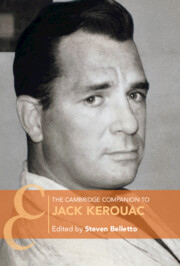Book contents
- The Cambridge Companion to Jack Kerouac
- The Cambridge Companion to Jack Kerouac
- Copyright page
- Contents
- Notes on Contributors
- A Kerouac Chronology
- Additional material
- Introduction
- Chapter 1 Kerouac’s Concept of His Duluoz Legend
- Chapter 2 Kerouac and the Profession of Authorship
- Chapter 3 Truth in Confession
- Chapter 4 The Textuality of Performance
- Chapter 5 The Spontaneous Aesthetic in The Subterraneans
- Chapter 6 Kerouac and the 1950s
- Chapter 7 The Impact of On the Road on the 1960s Counterculture
- Chapter 8 Vanity of Duluoz and the 1960s
- Chapter 9 Late Kerouac, or the Conflicted “King of the Beatniks”
- Chapter 10 Visions of Cody as Metafiction
- Chapter 11 Making the Past Present
- Chapter 12 Spun Rhythms
- Chapter 13 Kerouac’s Representations of Women
- Chapter 14 Kerouac and Blackness
- Chapter 15 Kerouac, Multilingualism, and Global Culture
- Chapter 16 The Two Phases of Jack Kerouac’s American Buddhism
- Chapter 17 Jack Kerouac’s Ambivalences as an Environmental Writer
- Chapter 18 The Essentials of Archival Prose
- Further Reading
- Index
- Cambridge Companions To …
Chapter 18 - The Essentials of Archival Prose
Published online by Cambridge University Press: 31 October 2024
- The Cambridge Companion to Jack Kerouac
- The Cambridge Companion to Jack Kerouac
- Copyright page
- Contents
- Notes on Contributors
- A Kerouac Chronology
- Additional material
- Introduction
- Chapter 1 Kerouac’s Concept of His Duluoz Legend
- Chapter 2 Kerouac and the Profession of Authorship
- Chapter 3 Truth in Confession
- Chapter 4 The Textuality of Performance
- Chapter 5 The Spontaneous Aesthetic in The Subterraneans
- Chapter 6 Kerouac and the 1950s
- Chapter 7 The Impact of On the Road on the 1960s Counterculture
- Chapter 8 Vanity of Duluoz and the 1960s
- Chapter 9 Late Kerouac, or the Conflicted “King of the Beatniks”
- Chapter 10 Visions of Cody as Metafiction
- Chapter 11 Making the Past Present
- Chapter 12 Spun Rhythms
- Chapter 13 Kerouac’s Representations of Women
- Chapter 14 Kerouac and Blackness
- Chapter 15 Kerouac, Multilingualism, and Global Culture
- Chapter 16 The Two Phases of Jack Kerouac’s American Buddhism
- Chapter 17 Jack Kerouac’s Ambivalences as an Environmental Writer
- Chapter 18 The Essentials of Archival Prose
- Further Reading
- Index
- Cambridge Companions To …
Summary
This chapter argues that Kerouac’s oeuvre must be reassessed as a unique case of the literary deployment of the archival. “Spontaneous” names the author’s instrument of choice because it serves his goals of leaving a “complete record” behind and becomes the means of (re)capturing the origins – or provenance – of the poetic insight and narrative structure of his innermost memories. Kerouac’s Spontaneous Prose method is thus a technique in the service of the most archival of impulses; the wish to record and preserve all experience for posterity. Spontaneous poetics is where provenance meets recording eye. This thirst for capturing the moment is motivated by Kerouac’s passion for origins – not just regarding his own ancestry and French-Canadianness but, as a writer, he further hopes to record the very inception of all epiphanies, emotions, sensations he experiences. In particular, this chapter examines Visions of Cody, in which his archival sensibility is most evident, showing that the novel both embodies the archival character of Kerouac’s novelistic form while simultaneously serving an archival function of preservation.
Keywords
- Type
- Chapter
- Information
- The Cambridge Companion to Jack Kerouac , pp. 256 - 272Publisher: Cambridge University PressPrint publication year: 2024

